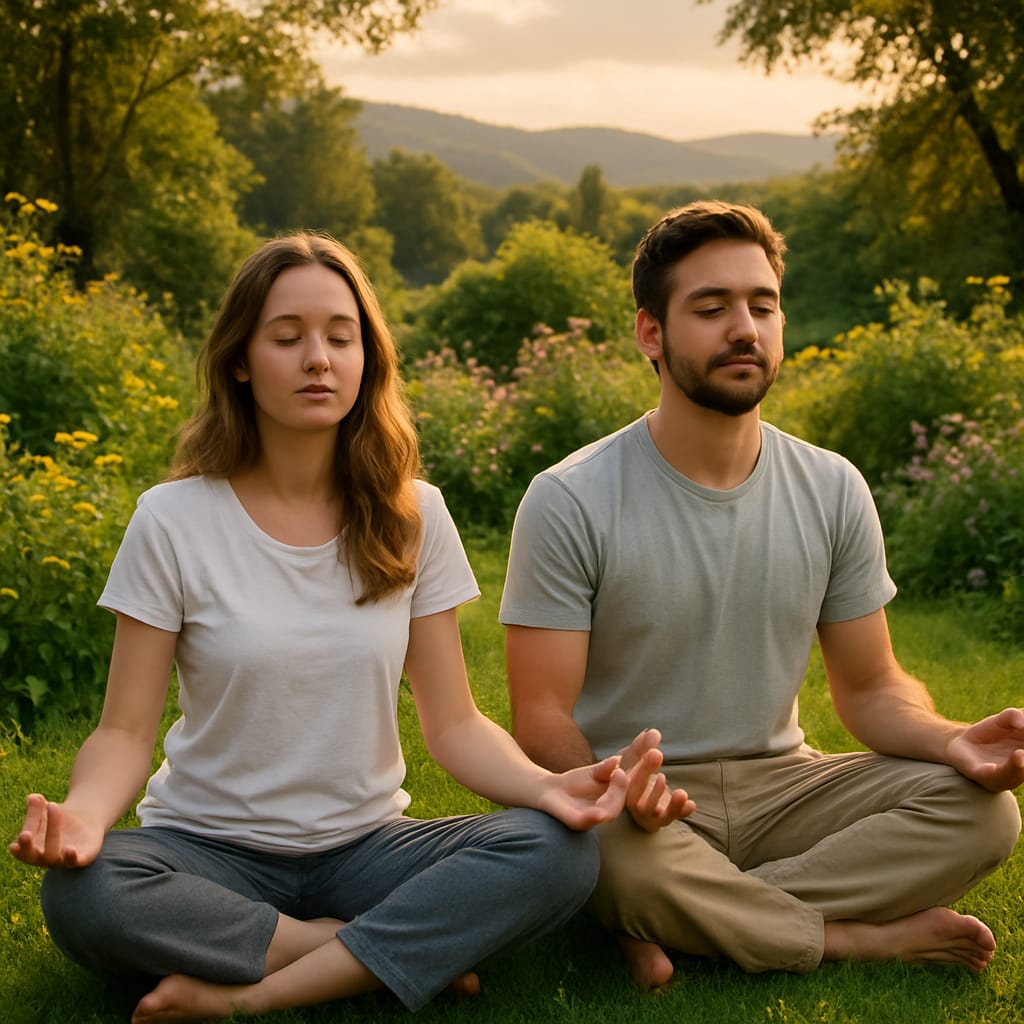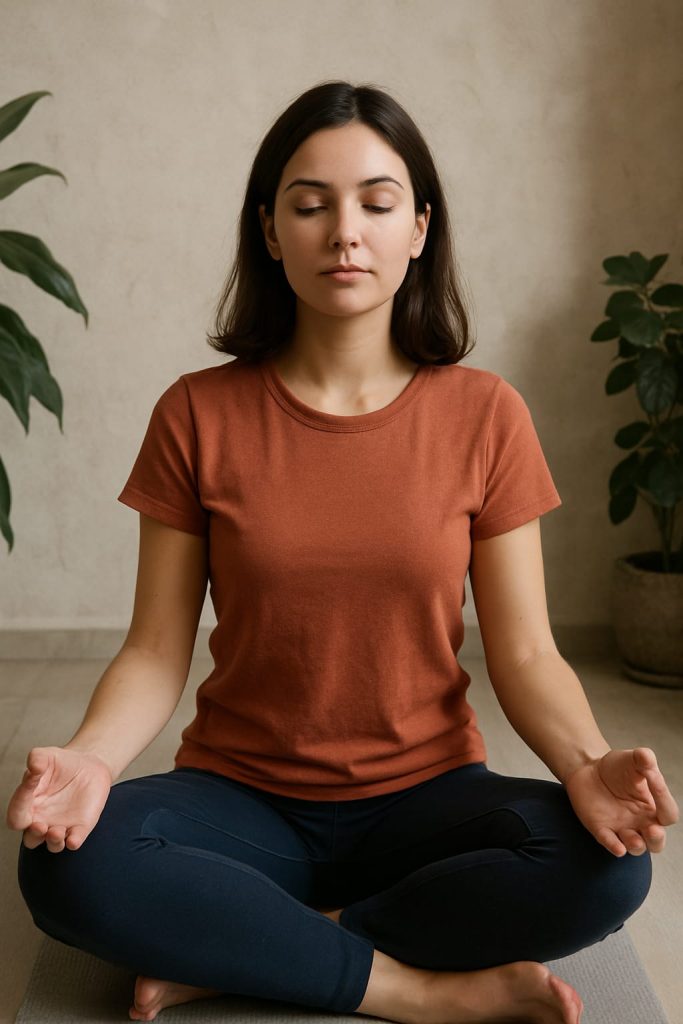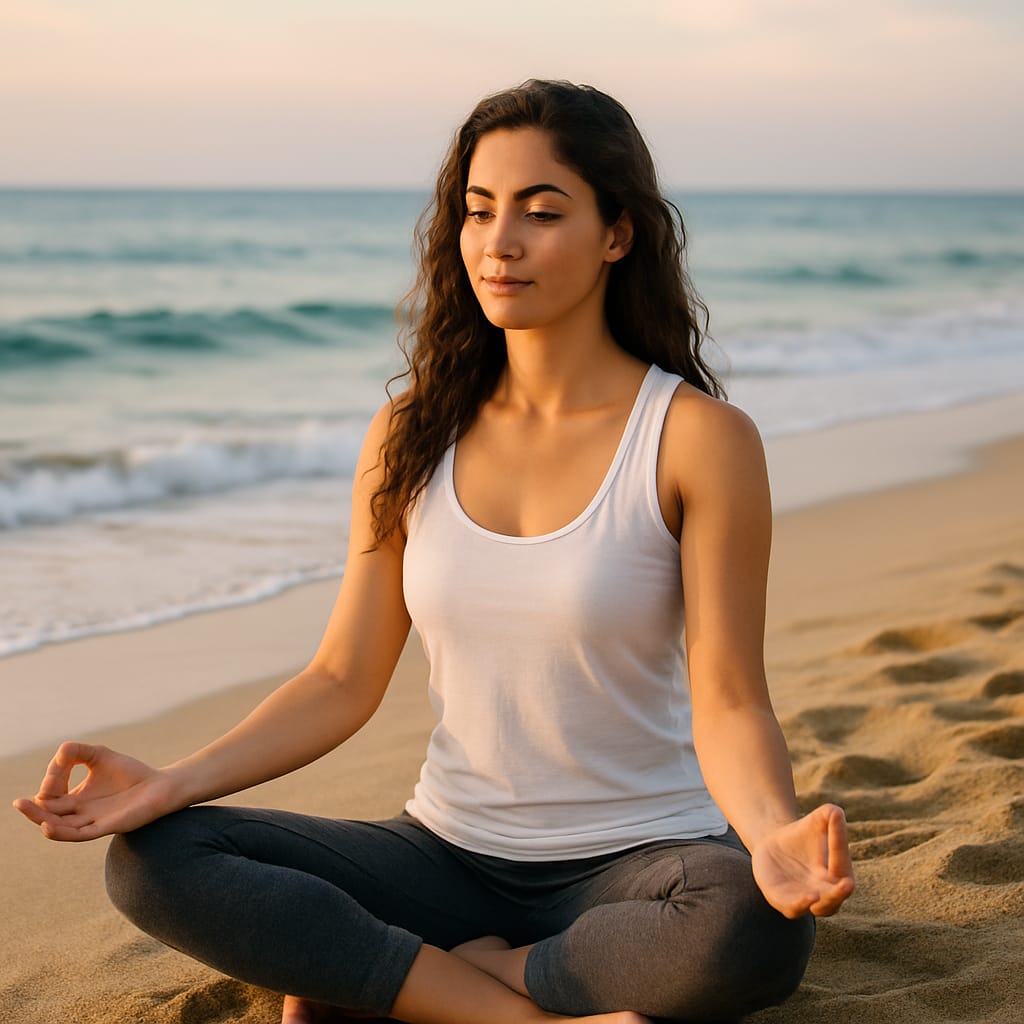Discover the Magic of Meditation for Stress and Anxiety: A Natural Solution
What is stress and anxiety meditation?
Stress and anxiety meditation is just a technique where you spend a few minutes pausing, breathing, and focusing on the here and now. It’s not about getting your mind blank or sitting absolutely still for hours on end. Rather, it’s about carving out a small bit of space in your hectic day to breathe a little more slowly. With practice, meditation quiets the whirring thoughts that drive anxiety and stress. It provides your mind with a welcome respite and shows you how to react to adversity with greater calm and patience.
🔅 How meditation is a natural cure for stress
One of the greatest things about meditation for stress and anxiety is that it’s entirely natural. There’s no pill, no machinery, and no expense. As you meditate, your body moves to a state of relaxation your breathing deepens, your heart rate steadies, and those tension-producing stress hormones start to decrease. Meditation is like pressing a reset button on your mind and body, many people describe. Rather than grabbing quick fixes, you’re giving yourself a subtle but enduring solution.
🔅Simple ways to begin meditation at home
Begin meditation for stress and anxiety without having to make it complicated. You don’t require special cushions or a peaceful mountain retreat. Just sit comfortably on a chair or your bed, close your eyes, and concentrate on your breath. If you prefer, play some soft music or attempt a guided meditation through a free app or YouTube video. The secret is to keep it simple 5-10 minutes a day in the early stages is all you need. Don’t worry if your mind has wandered (it will!). Bring it back gently every time to your breath or the present moment.
🔅How meditation slows down racing thoughts
When you’re stressed or anxious, your mind tends to get inundated with a torrent of thoughts worrying about the future, dwelling on past failures, or fantasizing worst-case scenarios. Meditation for stress and anxiety instructs you to see these thoughts without getting entangled with them. Picture clouds passing by in the sky. You don’t attempt to grab them or shove them away you just observe. With meditation, you learn the same with your thoughts. This breaks the loop of excessive thinking and makes your mind calmer.
🔅How much time do you actually require for meditation?
Most people believe they should sit for hours to receive the benefits of meditation, but that’s not at all the case. Meditation for stress and anxiety is perfect even if you begin with a few minutes daily. It’s most important to be consistent. Five minutes in the morning or before you sleep can establish a good mood or relax you after a tiring day. Eventually, you may find yourself meditating longer because you’ll come to love that feeling of calm.
🔅 Developing emotional resilience through meditation
Life does not always go smoothly. Sometimes things seem unsure or too much to handle. At times like these, meditation for stress and anxiety behaves as an anchor that holds you stable. The more you meditate, the more you’ll be able to remain calm in adversity. Rather than jumping into panic or frustration, you’ll notice that you can breathe, pause, and respond wisely. This strength of emotion not only serves you well in times of stress but also enhances your relationships and happiness in general.
🔅 No one way just your way
Many worry about “doing it right” when they begin meditation. But the good news is, there’s no perfect way. Stress and anxiety meditation is a very personal thing, and what works for one person may not work for another. Some like sitting in stillness, while others like guided or even walking meditations. The point is to discover what feels comfortable for you. It’s your turn to get connected with yourself, so release any pressure to meditate for stress and anxiety in a specific way. What is important is that you be present for yourself, with compassion and patience.
🔅Tiny daily steps, giant long-term rewards
The magic of meditation for anxiety and stress is in tiny, daily moments. Just as exercise keeps your body in shape, meditation keeps your mind clear and resilient. At the beginning, the effects may be subtle you may see you are sleeping a bit better, or less irritable when things don’t go right. But as the weeks and months pass, those little moments accumulate. Meditation teaches you to create lasting calm, improved concentration, and a sense of greater well-being that carries you through the ups and downs of life

The Powerful Benefits of Meditation for Stress and Anxiety You Should Know
In today’s fast-paced world, it’s easy to feel overwhelmed by life’s endless responsibilities. Whether it’s work pressure, personal challenges, or simply the rush of daily life, stress and anxiety seem to have become an unwelcome part of our routines. This is where meditation for stress and anxiety can make a real difference. Most individuals find that a few minutes of daily meditation can provide a calm and clear sense of being that allows them to better manage their concerns.
Unlike transitory distractions or fleeting quick fixes, stress and anxiety meditation provides a natural and enduring method for responding to mental tension. It enables your mind to decelerate, enabling you to concentrate on the moment in front of you rather than becoming mired in fearful thoughts about what may happen later or in resentful thoughts about what has already passed.
By regularly practicing meditation for stress and anxiety, you establish an environment whereby your mind and body are actually able to relax. This relaxation time serves to lower your heart rate, alleviate muscle tension, and decrease the concentration of stress hormones within your system. With practice, individuals who make meditation a regular habit say they feel more centered and less reactive to daily stressors. And the beauty of meditation for anxiety and stress is that it doesn’t have to be done in any special location or with any kind of equipment you can sit in a chair at home, lie in your bed, or even use a brief break at work. A few deep breaths and a bit of stillness can reset you.
Another reason that meditation for stress and anxiety is becoming more popular is that it shows you how to watch your thoughts but not judge them. Too often, stress and anxiety get worse because we struggle with our thoughts or try to suppress them. But in meditation, you come to accept these thoughts and allow them to pass, like clouds drifting across the sky. This kind awareness helps interrupt the pattern of ruminative thinking that perpetuates anxiety. Rather than responding with fright or irritation, you learn to respond with patience and compassion towards yourself and the circumstance alike.
🧘Meditation for Stress and Anxiety: Tips to Get Started Without Pressure
For beginners, stress and anxiety meditation can begin with easy methods such as becoming aware of your breath, repeating a soothing word or mantra, or kind of bringing your mind back gently every time your mind drifts. Even if you are fidgety initially, don’t be concerned. You’ll get more comfortable with being in the moment and receiving the calming benefits after practice. Most are amazed at how rapidly they start to feel positive changes both in their mood, of course, but also their sleep, focus, and overall health.
As well as assisting with everyday stress, meditation for stress and anxiety can also be an accommodating companion in tougher times. When life presents you with unforeseen challenges, meditation provides you with an anchor to grip. It assists you in remaining grounded, even when all around you seems wavering. And through ongoing practice, you might find that you’re more capable of dealing with issues with confidence and not panic.

Rather than getting carried away by negativity, you acquire inner resilience and strength. Keep in mind that meditation for stress and anxiety isn’t about becoming perfect or totally emptying your mind. Instead, it’s about carving out a bit of time in your day to stop, breathe, and reconnect with yourself. Each person’s experience with meditation will be different, and there is no right or wrong way to meditate. Most important is a style and routine that suits you comfortably. Whether your preference is guided meditations, silent sitting, or gentle movement practices such as mindful walking, the most important thing is to be consistent. A couple of minutes a day is much better than an extended session from time to time.
If you’re thinking of giving meditation for stress and anxiety a try, begin with small amounts. Five to ten minutes a day can establish the tone for a quieter, more focused you. There are plenty of free resources out there apps, online classes, and local classes that can lead you gently into the practice. And don’t be discouraged if your mind is racing initially. That’s perfectly natural. The mere act of sitting down and arriving for yourself is already a powerful move towards stress reduction and building inner peace.
In short, meditation for stress and anxiety is a present you can gift yourself anywhere, anytime. It doesn’t cost money, it has zero negative side effects, and the more you use it, the greater the benefits. This easy-to-use tool in a chaotic world can provide you with moments of calm and clarity, balancing the mind and body. Whether you’re dealing with small daily stresses or larger life challenges, meditation offers a gentle, effective way to find your center and move forward with greater ease and confidence.

